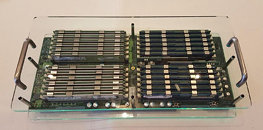- Joined
- Oct 9, 2007
- Messages
- 47,890 (7.38/day)
- Location
- Dublin, Ireland
| System Name | RBMK-1000 |
|---|---|
| Processor | AMD Ryzen 7 5700G |
| Motherboard | Gigabyte B550 AORUS Elite V2 |
| Cooling | DeepCool Gammax L240 V2 |
| Memory | 2x 16GB DDR4-3200 |
| Video Card(s) | Galax RTX 4070 Ti EX |
| Storage | Samsung 990 1TB |
| Display(s) | BenQ 1440p 60 Hz 27-inch |
| Case | Corsair Carbide 100R |
| Audio Device(s) | ASUS SupremeFX S1220A |
| Power Supply | Cooler Master MWE Gold 650W |
| Mouse | ASUS ROG Strix Impact |
| Keyboard | Gamdias Hermes E2 |
| Software | Windows 11 Pro |
Rambus Inc. (NASDAQ: RMBS) today announced it will collaborate with Microsoft researchers in the exploration of future memory requirements for quantum computing. The expertise of Rambus in high-bandwidth, power-efficient memory architectures, combined with Microsoft researchers' knowledge of advanced system and data center design will be applied to drive new technology platforms.
"Existing computer architectures are reaching limits due to the ever increasing demands of real-time data consumption, which is driving the need to explore new high-performance, energy-efficient computer systems," said Gary Bronner, vice president of Rambus Labs. "By working with Microsoft on this project, we can leverage our vast expertise in memory systems to identify new architectural models."

"We've been investing in projects that advance our understanding of quantum computing along with its applications and implementation," said Douglas Carmean, Architect, Quantum Architectures and Computation Microsoft Research. "We are focusing on exploring theoretical and experimental approaches to creating quantum computers, designing software, hardware and other elements that support our research and direction. In this process, we are engaging with partners that have critical expertise, such as Rambus, to build new types of computing platforms."
Rambus has a long history of researching and exploring emerging platforms, developing meaningful technologies with broad applicability. As part of this program, Rambus and Microsoft will pool resources to further examine potential architectures that can greatly enhance memory capabilities in various settings to improve overall system performance. Specific details of the project are confidential.
View at TechPowerUp Main Site
"Existing computer architectures are reaching limits due to the ever increasing demands of real-time data consumption, which is driving the need to explore new high-performance, energy-efficient computer systems," said Gary Bronner, vice president of Rambus Labs. "By working with Microsoft on this project, we can leverage our vast expertise in memory systems to identify new architectural models."

"We've been investing in projects that advance our understanding of quantum computing along with its applications and implementation," said Douglas Carmean, Architect, Quantum Architectures and Computation Microsoft Research. "We are focusing on exploring theoretical and experimental approaches to creating quantum computers, designing software, hardware and other elements that support our research and direction. In this process, we are engaging with partners that have critical expertise, such as Rambus, to build new types of computing platforms."
Rambus has a long history of researching and exploring emerging platforms, developing meaningful technologies with broad applicability. As part of this program, Rambus and Microsoft will pool resources to further examine potential architectures that can greatly enhance memory capabilities in various settings to improve overall system performance. Specific details of the project are confidential.
View at TechPowerUp Main Site






